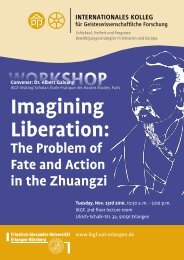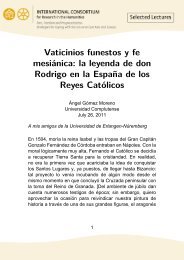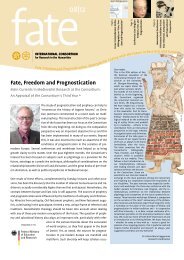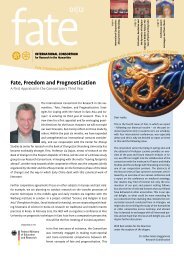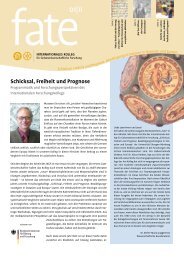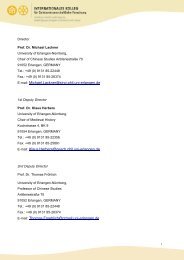Fate, Freedom, and Prognostication - International Consortium for ...
Fate, Freedom, and Prognostication - International Consortium for ...
Fate, Freedom, and Prognostication - International Consortium for ...
You also want an ePaper? Increase the reach of your titles
YUMPU automatically turns print PDFs into web optimized ePapers that Google loves.
<strong>Fate</strong>, <strong>Freedom</strong> <strong>and</strong> <strong>Prognostication</strong>.<br />
Strategies <strong>for</strong> Coping with the Future in East Asia <strong>and</strong> Europe<br />
pretation as having eschatological meaning. Having first been classified<br />
as an event of apocalyptic significance, the growing transnational<br />
knowledge through clerical envoys <strong>and</strong> mercantile exchange gave<br />
rise to disciplines such as astrology, astronomy <strong>and</strong> mathematics.<br />
The closing lecture of the conference showed once again that in the<br />
field of medieval studies the topics of apocalyptic movements <strong>and</strong><br />
astrology are central <strong>for</strong> answering questions regarding fate <strong>and</strong> prognostication.<br />
The field of apocalyptic studies was already part of the<br />
research thread at the consortium in its first year, with PD Dr. Hannes<br />
Möhring working on eschatological expectations around the year<br />
1000 CE <strong>and</strong> this research area will be continued in the coming year.<br />
Research in the field of astrology will feature at the consortium in<br />
the academic year 2011/12. Declaring astrology the mantic Leitdisziplin<br />
of the European Middle Ages, this role can be allocated accordingly<br />
in the Chinese cultural sphere to the Book of Changes (Yijing), which<br />
makes up a research area of its own at the consortium. The consortium<br />
is expecially honoured that Prof. Dr. Richard Smith is one of its<br />
advisory board members. Prof. Smith – one of the Western leading<br />
research specialists on the Yijing <strong>and</strong> its cultural impact – prepared a<br />
paper analysing traditional Chinese divination as an indigenous <strong>for</strong>m<br />
of Chinese psychotherapy – which is often declared as not existing.<br />
The annual conference revealed in a number of ways the comparative<br />
approach of the consortium <strong>and</strong> the current research projects.<br />
Through the lectures of well-known sinologists, medievalists <strong>and</strong> political<br />
scientists the special relevancy of the question regarding fate<br />
w O R K s H O P s<br />
14<br />
<strong>and</strong> prognostication in the context of current academic research became<br />
clear. The focus on a previously marginalised dimension of European<br />
as well as Asian academic research enriches current academic<br />
discussion <strong>and</strong> offers new insight. It is part of a growing consciousness<br />
of transcultural interdependencies <strong>and</strong> historical transnational<br />
flows <strong>and</strong> can also react specifically on a new awareness of contingency,<br />
close to the current Zeitgeist, oscillating between economic<br />
crisis <strong>and</strong> esoteric diversification. Leitdisziplinen - the Book of Changes<br />
in China <strong>and</strong> astrology <strong>and</strong> apocalyptic expectations in the European<br />
Middle Ages – reveal their specific characteristics through the<br />
comparative approach. Last but not least the cooperation of different<br />
researchers was highlighted during a break by an American conference<br />
participant <strong>and</strong> media <strong>and</strong> communication studies expert who<br />
claimed to be amazed <strong>and</strong> declared “This is someway what I always<br />
imagined as being European academic life”: The multiplicity of languages<br />
<strong>and</strong> the vocal mixture of German, Chinese, English, Spanish,<br />
French <strong>and</strong> Italian gave the discussions, key notes speeches <strong>and</strong> casual<br />
talks a character worth cultivating. The international exchange<br />
enriches research <strong>and</strong> also German research can contribute via its<br />
own research traditions – such as through the Fachprosa<strong>for</strong>schung<br />
mentioned by Prof. Dr. Donald Harper in tackling the question of how<br />
to methodologically analyse household encyclopedias <strong>and</strong> culturally<br />
bound organisations of knowledge.<br />
Mantic, <strong>Fate</strong> <strong>and</strong> <strong>Freedom</strong> in the Medieval Ages*<br />
Prof. Dr. Loris Sturlese (IKGF Visiting Fellow; Università del Salento, Lecce) – June 8th-9th, 2010<br />
Many prominent Greek <strong>and</strong> Latin thinkers of Antiquity (Cicero, the Stoics, Pseudo-<br />
Plutarch, Alex<strong>and</strong>er of Aphrodisias, Plotin, Proklos) <strong>and</strong> of early Christianity (Tertullian,<br />
Minucius Felix) engaged explicitly with the problem of fate, providence <strong>and</strong> human<br />
freedom. Gregory the Great summarised the mainstream Christian answer to<br />
such questions as follows: “Absit a fidelium cordibus, ut fatum aliquid esse credatur”.<br />
700 years later another saint, Albert the Great, argued <strong>for</strong> a diametrically contrasting<br />
opinion: “... ideo fatum negantes esse non audimus, quia falsum dicunt.” In the time<br />
which passed between the two statements by these two well-known theologians a<br />
complex history of a gradual adoption by the Latin West of scientific, astronomical<br />
<strong>and</strong> astrological texts <strong>and</strong> theorems unravelled. The term destiny came to be closely<br />
connected with astral determinism. This astral determinism provided a theoretical<br />
framework which enabled, on the one h<strong>and</strong>, scientific research into the laws of nature;<br />
<strong>and</strong>, on the other, the development of mantic practices (<strong>for</strong> example geoman-<br />
Dr. Esther-Maria Guggenmos<br />
Research Coordinator<br />
cy). Texts from the hermetic tradition supplemented<br />
the dominant observational, contemplative method of<br />
scientists in the Aristotelian tradition through hinting<br />
at a practice, which tried to channel astrological influence<br />
through suitable actions (talismans, invocations).<br />
The aim of the workshop was to explore the state of<br />
the field with respect to questions of fate <strong>and</strong> destiny<br />
through the disciplines of philosophy, theology <strong>and</strong> the<br />
history of science <strong>and</strong> to highlight possible research directions<br />
<strong>for</strong> the future. The workshop was about identifying<br />
<strong>and</strong> discussing relevant texts, with the aim to<br />
discuss <strong>and</strong> initiate editions of promising, unpublished<br />
manuscripts, <strong>and</strong> to discuss the practicability, difficul-



